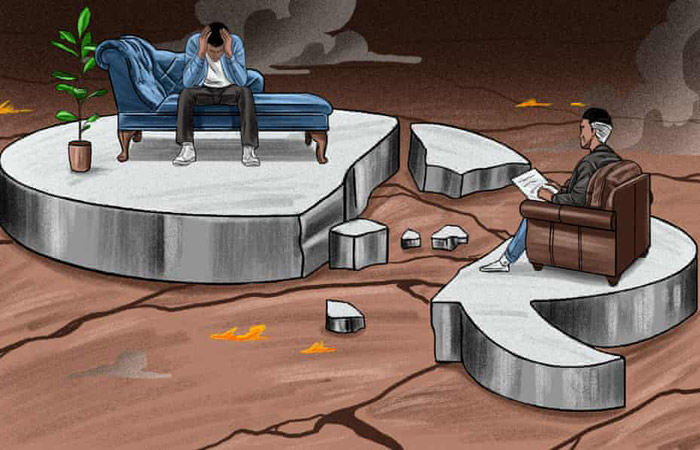Eco-anxiety is a type of mental disorder where the person suffers from the fear of climate damage or ecological disaster. This type of anxiety primarily depends on the present and predicted future state of the environment and climate change. A study was published in 2018 and according to it; nearly 70% of people in the United States have anxiety about climate change, and nearly 51% of people feel helpless.
So, in a nutshell, climate anxiety or eco-anxiety refers to chronic or severe anxiety related to the environment.
Symptoms of Climate Change Anxiety
If you get worried about the changes in temperature, weather, and animal and human habitats, then this anxiousness is completely reasonable. Many people in the world are deeply distressed by the harm already done to natural resources.But an enhanced sense of hopelessness about the planet’s changes indicates that you may suffer from eco-anxiety.
Some potential symptoms include:
- Anger or frustration especially towards those people who are responsible for climate change
- Fatalistic thinking
- Existential dread
- Shame related to your own carbon footprint
- Post-traumatic stress due to climate change
- Depression, anxiety, or panic
- Anguish over the loss of natural environments or resources
- Fanatical thoughts about the climate
Some secondary issues could be:
- Sleep problems
- Appetite changes
- Difficulties while concentrating
Due to severe stress, you may share distasteful relationships with friends, romantic partners, or family members, especially if their views contradict climate change.
Who Does It Affect?
Not all people will feel eco-anxiety equally. Some used to feel this climate depression and ecological problems more intensely as compared to their counterparts. People who are living in extreme conditions are more susceptible to the effects of eco-anxiety. People who used to stay in coastal communities and low-lying areas are more prone to this type of anxiety. People who are associated with certain occupations like fishing, tourism, and agriculture are more prone to this disorder.6 Easy Tips to Deal with Eco-Anxiety You Should Know
By implementing several strategies, a person can manage his/her responses to ecological issues. Follow the below-mentioned tips if you have eco-anxiety.- Taking Action
- Getting Educated
- Stress on Resiliency
- Stay Optimistic
- Spend Some Time in Nature
- Be Active
1. Taking Action
By taking some positive actions, you can reduce the feelings of anxiety and hopelessness.Some positive actions could be:
- Talk to your neighbors or friends regarding some good ecological practices
- Volunteering some environmental groups
- Incorporate greener choices into your daily regime including recycling. Discard meat and dairy as much as possible and eat a sustainable diet
Consult mental health professionals who will identify your problems and will offer you a plan that will help you to control the issues.
2. Getting Educated
Education is the best way to enhance your knowledge regarding a disease. Try to acquire adequate information about where the environment overshadows communities so that you can help those people by preparing a resilient plan in case of any contingency. If you don’t have sufficient knowledge, you can’t understand and process abstract problems, including climate change. You can control this issue to some extent with your knowledge about environmental problems.3. Stress on Resiliency
People who are resilient can manage stress and trauma and may handle anxiety than those with less confidence in their flexibility skills.People who have resiliency skills can overcome depression and other natural disaster problems. Some tips you can follow to improve your resilience are:
- Nurturing caring, trusting relationships that offer support and encouragement
- Never view problems as impossible
- Try to solve prospects in a wider aspect
- Practice healthy self-care habits and try to build a positive self-image
- Get connected with people from places and cultures when possible
- Don’t stay alone or isolated, rather try to mingle with like-minded people
4. Stay Optimistic
Always stay optimistic to deal with stressful events like natural disasters. People who try to refurbish everything positively may handle their anxiety in a better way. Positive thinking extirpates negative beliefs associated with chronic or severe anxiety.5. Spend Some Time in Nature
If you can spend some time outdoors or with nature, this may assuage your eco-anxiety by establishing a positive personal connection with the climate.Some experts often recommend keeping a rock, twig, dried flower, or other natural substance that you can look at and touch when feeling disengaged or overawed. This may have many similarities to grounding techniques and experts advise this for managing anxiety.
6. Be Active
Regular exercise will help you in minimizing your anxiety. Walking, running, and cycling are the best exercises that minimize individual greenhouse gas emissions. People who do cycling or walking may experience lower levels of stress and anxiety.How does Therapy Manage Eco-Anxiety?
Though eco-anxiety is not any specific mental disease, still it can make a great impact on your life. If you are finding difficulties in managing the effects of eco-anxiety, then therapy may help you to control your anxiety and stress.All therapists will keep the focus on:
- Self-compassion works
- Developing coping skills to manage emotional anguish
- To get rid of anxiety or depression
- Design a personal self-care plan
Ecotherapy is an evolving technique to manage your mental health due to climate-changing activities. This therapy heightens the importance of nurturing and also, helps you to establish a connection with nature.



